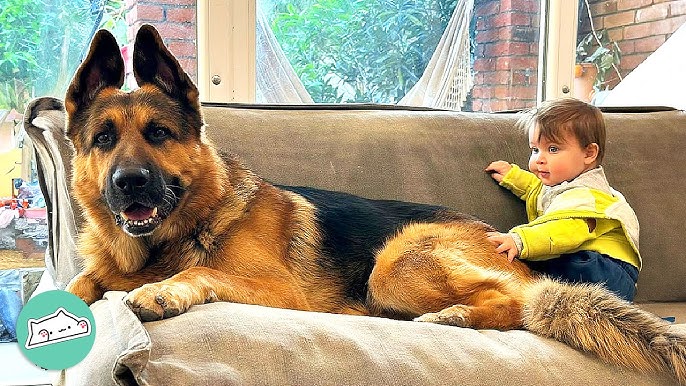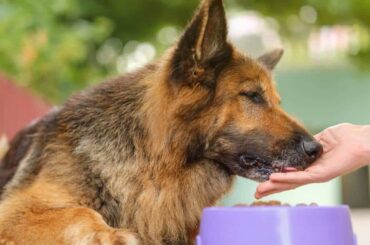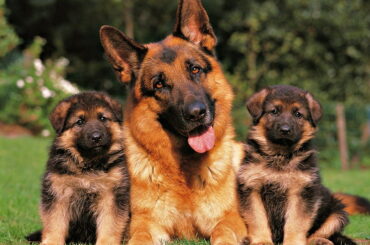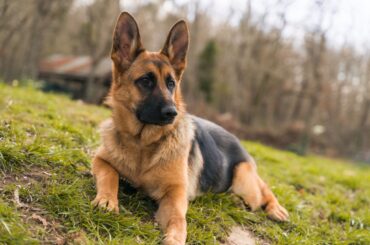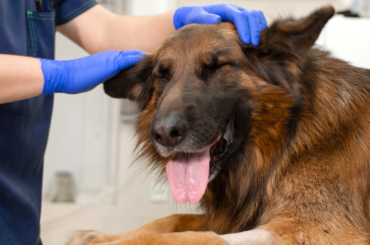We present to you 10 important things for every German Shepherd to know,
What should I feed my German Shepherd for a balanced diet ?
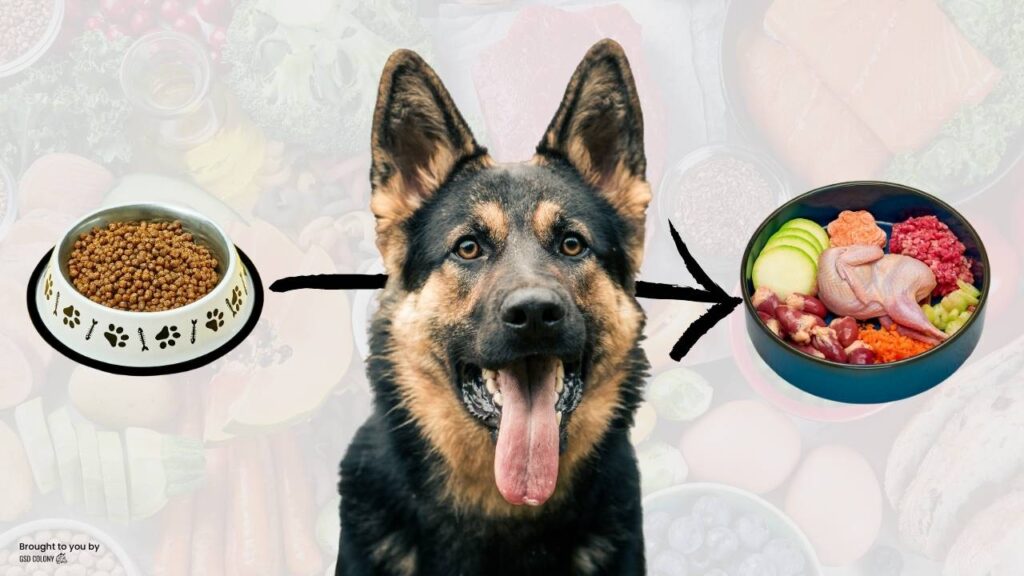
Owning a German Shepherd comes with the responsibility of ensuring they receive a well-balanced diet to support their overall health and well-being. Proper nutrition is crucial for maintaining their energy levels, promoting strong muscles and bones, and preventing potential health issues. In this article, we’ll explore practical tips and examples to help you provide the best nutrition for your German Shepherd.
- Understanding Your German Shepherd’s Nutritional Needs:
German Shepherds are known for their agility, intelligence, and strength, and their nutritional requirements differ from other dog breeds.
They need a diet rich in high-quality proteins, moderate fat, essential vitamins, and minerals. Look for dog food labeled as “complete and balanced” to ensure it meets these criteria.
- High-Quality Protein Sources:
Protein is a key component of a German Shepherd’s diet as it supports muscle development and overall health. Look for dog food with real meat as the primary ingredient, such as chicken, beef, or lamb. Additionally, consider including lean protein sources in their diet, like eggs, cottage cheese, and fish.
Example: Opt for a premium dog food brand like “Blue Buffalo Life Protection Formula,” which contains deboned chicken as the first ingredient, providing the essential protein your German Shepherd needs.
- Healthy Fats:
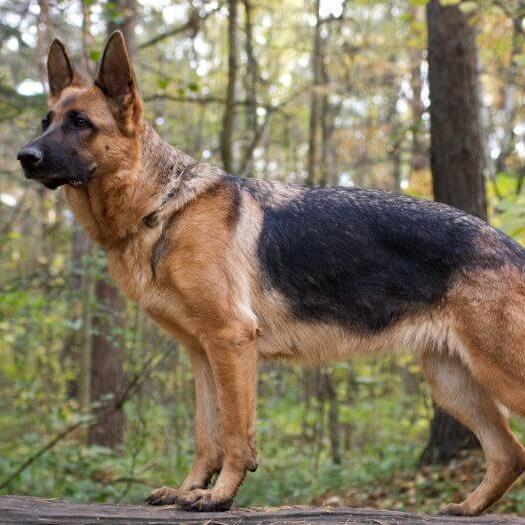
Fats are essential for maintaining a healthy coat, skin, and overall energy levels.
Choose dog food with a moderate amount of healthy fats, including omega-3 and omega-6 fatty acids. Sources of healthy fats include fish oil, flaxseed, and chicken fat.
Example: “Hill’s Science Diet Adult Large Breed” dog food includes omega-6 fatty acids and vitamin E to support a shiny coat and healthy skin.
- Carbohydrates for Energy:
While protein and fat are essential, carbohydrates provide the necessary energy for your German Shepherd’s daily activities. Opt for whole grains, vegetables, and legumes as sources of complex carbohydrates.
Example: “Nutro Wholesome Essentials Large Breed Adult” dog food includes brown rice, sweet potatoes, and oatmeal for a balanced source of carbohydrates.
- Avoiding Harmful Additives:
Steer clear of dog foods with artificial colors, flavors, and preservatives, as these can potentially harm your German Shepherd’s health. Opt for natural and easily digestible ingredients.
Example: “Wellness CORE Grain-Free Original Formula” is a grain-free option without artificial additives, providing a nutritious and easily digestible meal for your German Shepherd.
- Portion Control and Feeding Schedule:
Maintain a consistent feeding schedule and practice portion control to prevent obesity and related health issues. The amount of food your German Shepherd needs depends on factors like age, activity level, and metabolism.
Example: Use a measuring cup to portion out your dog’s meals, and divide their daily food allowance into two or three meals for better digestion.
How often should I feed my German Shepherd?
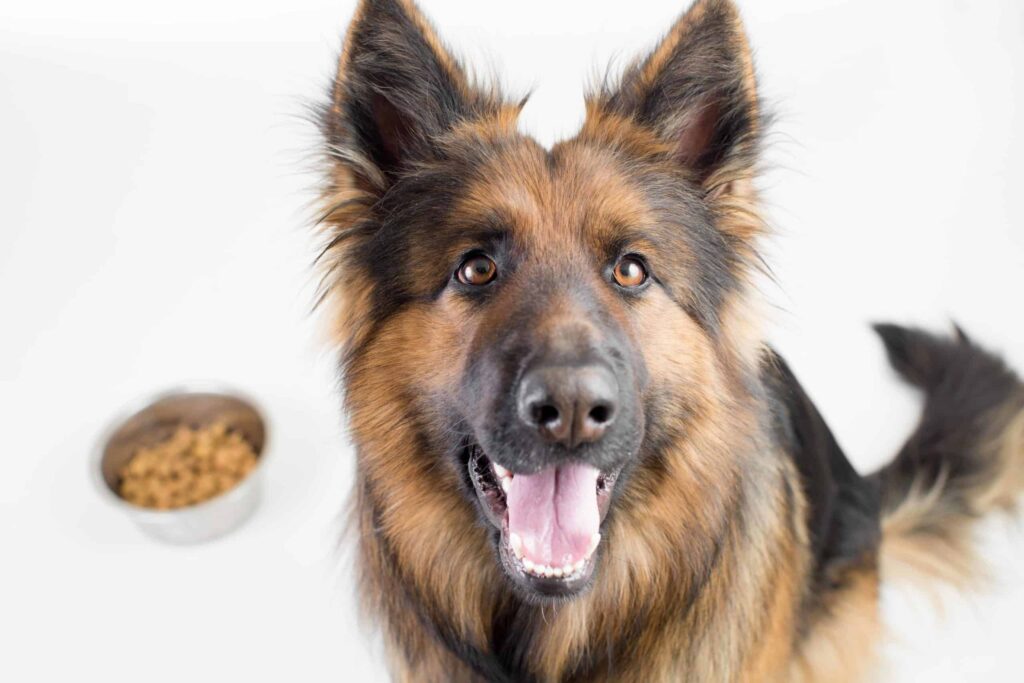
Feeding frequency for your German Shepherd depends on various factors such as age, activity level, and individual health needs. Generally, adult German Shepherds are typically fed twice a day, while puppies may require more frequent meals.
-
Puppies (Up to 6 Months):
- Puppies have higher energy needs and smaller stomachs, so they benefit from more frequent meals.
- Aim for three to four meals a day to support their rapid growth and development.
- Divide their daily recommended food portion into multiple servings.
-
Adolescents (6 to 12 Months):
- As your German Shepherd puppy grows, you can gradually transition to feeding them two to three meals a day.
- Continue to monitor their weight and adjust portions accordingly.
-
Adults (1 to 7 Years):
- For adult German Shepherds, feeding twice a day is a common and practical approach.
- Divide their daily food portion into morning and evening meals to provide sustained energy throughout the day.
-
Seniors (7 Years and Older):
- Older dogs may benefit from two smaller meals to ease digestion and maintain a healthy weight.
- Consider specialized senior dog food formulations that cater to their changing nutritional requirements.
-
Active or Working Dogs:
- If your German Shepherd is highly active, involved in strenuous activities, or works as a service or working dog, consider additional meals or snacks to meet their increased energy demands.
- Split their daily intake into three meals to ensure a steady supply of nutrients
Can I feed my German Shepherd a raw diet ?
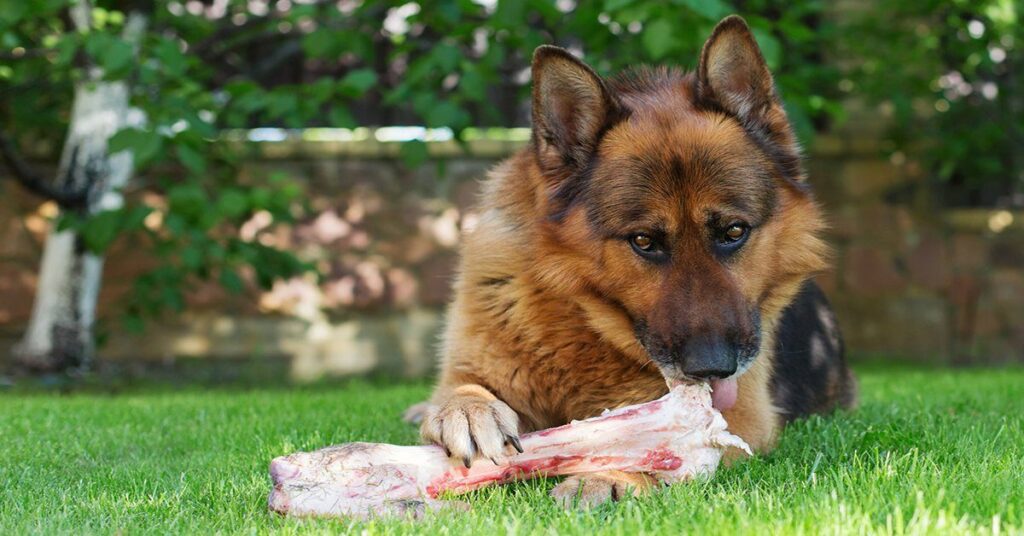
Feeding a raw diet, also known as a raw or BARF (Biologically Appropriate Raw Food) diet, to a German Shepherd is a personal choice that comes with both benefits and potential risks. Before transitioning your dog to a raw diet, it’s essential to consider various factors and consult with your veterinarian to ensure it is a suitable option for your individual dog.
Pros of a Raw Diet for German Shepherds:
-
Nutrient Content: Raw diets often include fresh meats, bones, and organs, providing a natural and biologically appropriate source of nutrients for dogs.
-
Improved Coat and Skin: Advocates of raw diets claim that the natural fats and oils in raw foods can contribute to a healthier coat and skin.
-
Dental Health: Chewing on raw bones can help maintain dental health by reducing plaque and tartar.
-
Reduced Fillers and Additives: Raw diets typically avoid common fillers and additives found in commercial dog food, potentially reducing the risk of allergies and sensitivities.
Cons and Considerations:
-
Nutritional Imbalance: Ensuring a well-balanced raw diet with the right proportions of protein, fat, vitamins, and minerals can be challenging. Imbalances can lead to nutritional deficiencies or excesses.
-
Risk of Bacterial Contamination: Raw meat can harbor harmful bacteria such as Salmonella or E. coli, posing a risk not only to your dog but also to household members.
-
Potential for Choking or Injury: Bones in a raw diet may pose a choking hazard or cause gastrointestinal obstruction if not appropriately sized or prepared.
-
Time and Effort: Preparing and maintaining a raw diet can be time-consuming and may require careful planning to ensure your dog receives a varied and complete menu.
Guidelines for Transitioning to a Raw Diet:
-
Consult with Your Veterinarian: Before making any changes to your dog’s diet, consult with your veterinarian. They can provide guidance based on your dog’s health, age, and specific dietary needs.
-
Gradual Transition: If you decide to transition to a raw diet, do so gradually to allow your dog’s digestive system to adjust. Start by introducing small amounts alongside their regular food.
-
Balanced Diet: Ensure your dog’s raw diet includes a variety of protein sources, organs, bones, and supplements if necessary to achieve a balanced nutritional profile.
-
Hygiene Practices: Maintain strict hygiene practices when handling raw meat to minimize the risk of bacterial contamination. Wash your hands thoroughly after preparing your dog’s meals.
Ultimately, the decision to feed your German Shepherd a raw diet should be well-informed and tailored to your dog’s individual needs. Regular veterinary check-ups can help monitor your dog’s health and address any concerns that may arise during the transition or while on a raw diet.
What are common dietary allergies in German Shepherds?

German Shepherds, like other dog breeds, can develop allergies to certain ingredients in their diet. Identifying and managing these allergies is crucial for maintaining your dog’s health and well-being. Common dietary allergies in German Shepherds often involve specific proteins, grains, or additives. Here are some of the common dietary allergens:
-
Beef:
- Some German Shepherds may develop allergies to beef proteins. If you notice symptoms like itching, gastrointestinal issues, or skin problems after feeding beef, it could be a potential allergen.
-
Chicken:
- Chicken is another common allergen for dogs, including German Shepherds. Allergic reactions may manifest as skin irritations, ear infections, or digestive problems.
-
Grains (Wheat, Corn, Soy):
- Grains such as wheat, corn, and soy are frequent allergens for dogs. Allergies to these grains can lead to skin itching, gastrointestinal upset, and ear infections. Opting for grain-free or limited-ingredient diets may help in managing these allergies.
-
Dairy:
- Lactose intolerance or dairy allergies can occur in some German Shepherds. Symptoms may include diarrhea, vomiting, or digestive discomfort after consuming dairy products.
-
Eggs:
- While eggs are a rich source of protein, some dogs, including German Shepherds, may be allergic to them. Allergic reactions can manifest as skin issues, digestive problems, or ear infections.
-
Soy:
- Soy is a common ingredient in many commercial dog foods. However, some German Shepherds may develop allergies or sensitivities to soy, leading to skin problems or gastrointestinal issues.
-
Artificial Additives:
- Artificial preservatives, colors, and flavors present in commercial dog food can trigger allergies in some dogs. Opt for dog food with natural ingredients and minimal additives.
Recognizing Allergy Symptoms:
- Skin Issues: Itching, redness, hot spots, or recurrent skin infections.
- Gastrointestinal Problems: Diarrhea, vomiting, flatulence, or changes in bowel habits.
- Ear Infections: Frequent ear scratching, redness, swelling, or a foul odor.
- Respiratory Issues: Sneezing, coughing, or nasal discharge.
Managing Allergies:
-
Elimination Diet: Work with your veterinarian to conduct an elimination diet, gradually introducing and removing specific ingredients to identify the allergen.
-
Hypoallergenic Diets: Consider hypoallergenic or limited-ingredient diets designed to minimize the risk of allergic reactions.
-
Allergy Testing: In some cases, allergy testing may help identify specific allergens, facilitating targeted dietary changes.
-
Consulting with Your Veterinarian: If you suspect your German Shepherd has dietary allergies, consult with your veterinarian. They can provide guidance on suitable diets, allergy testing, and recommend appropriate treatments or medications to manage symptoms.
Understanding and addressing dietary allergies in German Shepherds is essential for promoting their overall health and ensuring they lead comfortable and happy lives. Regular veterinary check-ups can aid in early detection and effective management of dietary allergies.
How much exercise impacts my German Shepherd’s diet?

Exercise plays a significant role in shaping the dietary needs of your German Shepherd. The amount and intensity of physical activity directly impact their metabolism, energy expenditure, and overall health. Here’s how exercise influences your German Shepherd’s diet:
-
Caloric Requirements:
- The level of exercise your German Shepherd engages in influences their caloric needs. Dogs that are more active and participate in regular exercise burn more calories and may require a higher calorie intake to maintain a healthy weight.
-
Protein Requirements:
- Active dogs, such as German Shepherds involved in agility training or working roles, need adequate protein to support muscle development and repair. High-quality protein sources become crucial in their diet to meet these demands.
-
Hydration Needs:
- Increased exercise leads to higher water loss through panting and sweating. Proper hydration is essential for your German Shepherd’s overall health, especially during and after exercise. Make sure they have access to clean and fresh water at all times.
-
Carbohydrates for Energy:
- Dogs use carbohydrates as a primary source of energy. Active German Shepherds benefit from diets that include complex carbohydrates, providing sustained energy during prolonged exercise sessions.
-
Balanced Nutrient Intake:
- Active dogs require a balanced mix of macronutrients and micronutrients. A diet rich in vitamins, minerals, and essential fatty acids helps support their overall well-being and maintain optimal performance.
-
Post-Exercise Nutrition:
- After intense exercise, your German Shepherd may benefit from a meal or snack that includes a balance of protein and carbohydrates to aid muscle recovery and replenish energy stores.
-
Weight Management:
- Regular exercise is crucial for weight management. Overweight dogs are at risk of various health issues, and exercise helps burn excess calories, promoting a healthy weight. Adjusting their diet based on their activity level is key to weight management.
Practical Tips for Feeding an Active German Shepherd:
-
High-Quality Diet: Provide a high-quality dog food that meets the nutritional needs of active German Shepherds. Look for formulations designed for large or active breeds.
-
Portion Control: Adjust the portion sizes based on your dog’s activity level to prevent overfeeding or underfeeding. Consult with your veterinarian to determine the right amount for your individual dog.
-
Protein-Rich Treats: If you use treats during training or as rewards, opt for protein-rich options to support your dog’s active lifestyle.
-
Supplements: Depending on their specific needs, consider adding supplements like joint support or omega-3 fatty acids to support their joint health and overall well-being.
-
Consistent Feeding Schedule: Maintain a consistent feeding schedule to regulate your dog’s metabolism, especially if they have a regular exercise routine.


